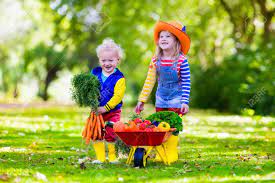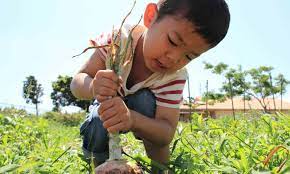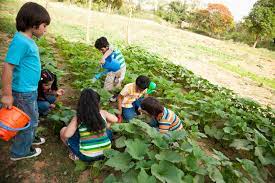Do you have a kid with exceptional skills and abilities?
Do you have a kid that is always curious, inquisitive, like to test or try things out, get his or her hand dirty in the good way?
Do you have one with rapt attention to details, like to see things grow and develop?
You are really in luck, you might be having a Kid-Agripreneur living with you in your house.
By default, kids are always like this, all you have to do is to guide, nurture and provide them the enabling environment to explore, to bring out the best in them.
Are you that loving parent that would like to train you kids in such a way that they grow up to be productive?
Or, you are very much interested in setting them up for a brighter future ahead of them and won't mind starting very early.
Do you want to keep your kids busy?
Because, you only think they are playful because they don't have something productive, enticing and captivating, that can catch their attention and keep them so engrossed in it to the extent that they do not have time to think about any other unproductive activities.
This guide is for you,
Read on!!!
- Nina Devani: At the young age of 14, Devani developed her first app – Prompt Me Nina – an app that allows users to set reminders for all of their passwords. She was inspired to do this after her father’s Facebook account was hacked. Despite being unable to code, Nina thought outside of the box and hired developers to help her create the app. The app was a success, causing her to be shortlisted for the NatWest Everywoman Awards in 2014. Now, on top of being the youngest nomination for such an award, Devani has 5 employees and 10 consultants working alongside her and her company, DevaniSoft Ltd.
- Ben Towers: Ben started in business at only age 11 and was nicknamed ‘The Smartest Kid on the Planet’. He first got into entrepreneurship when a family friend asked for his help to build their company website. As he had no prior knowledge in this, Ben turned to YouTube to self-teach himself the skill. Little did he know, such an action would spiral into him created ‘ Tower Designs’ – a digital media agency that works with brands who are looking to target young people through marketing. He has worked with brands such as Pot Noodle, NHS Give Blood, Amazon and Virgin Racing. Now 21, Ben is also the co-founder of Tahora – a workplace community solution providing a platform to truly address mental health.
- Henry Patterson: At 10 years old, Patterson wrote a book called the ‘Adventures of Sherb and Pip’ in 2014, which sold thousands of copies. In that same year, he started his lifestyle brand, Not Before Tea, an online shop which sells bags, soft toys, nursery décor, and children’s books. Now aged 15, Patterson’s products are stocked in over 60 UK stores and he has signed an animation deal to turn his book into a 12-episode cartoon.
- Rose Dyson: At age 15, Dyson started her lip care brand, Pura Cosmetics, with only £25. After entering a local enterprise competition, she saw a gap in the cosmetics market for ethical cosmetics at affordable prices. Since starting the business in 2015, Pura Cosmetics now has its own shop, an online store and is also stocked in 30 independent retailers. Dyson hopes that “In the next few years I want Pura to be the number one ethical lip scrub and care provider in the UK.”
- Lucy Berkovi: During the Covid-19 pandemic, Lucy decided it would be the best time to start her own business. The 11-year-old set up a business selling slime on websites like Etsy and TikTok. She soon created her own website, Lulu Bee Slimes, where she sells the different varieties she has on offer. From brightly coloured options to cookie dough slime, Lucy makes them all in the small factory she has set up in her bedroom. What started as a hobby to take up time during school closures has now become a fully-fledged business, with Lucy creating more and more slime recipes.
- Imogen Webber and Annie Barrett: Just like Berkoni, the 12-year-olds, Imogen Webber and Annie Barrett, also used the lockdown to start their own business. ‘Sweets Supreme’ is their confectionary business. They package sweets into pizza boxes and sell them for £4 each. The growing business has made a respectable profit of £200 after selling 50 boxes so far. They’ve also ensured that social media plays a heavy role in the advertising and exposure of their business, making sure to note that they get quite a few of their customers from Instagram.
- Jaeden Davison: 12-year-old, Jaeden Davison, took advantage of people’s growing interest in YouTube, specifically those who are interested in starting their own YouTube channel. As the video-sharing platform hosts videos which are becoming more and more professional looking, Jaeden capitalized off of this when he created his business which sells YouTube intro videos. Similar to a TV show opening credits, Jaeden creates short videos for content creators to put at the start of their channel to introduce it. He was smart enough to find a niche in the content creating market, having self-taught himself the skills he uses to create the video intros.
- Kirsten and Aiyven Mbawa: The Northampton tweens, Kirsten (13) and Aiyven (12) Mbawa, are a talented duo. The young debut authors used crowd-funding platform, Kickstarter, to help launch their book subscription service: Happier Every Chapter, in November 2020. Aimed at 8-14 year olds, their monthly boxes include 2 middle-grade fiction books (ensuring one is from a minority author), 2 short stories, activity sheets and a bunch of other bookish goodies. So far, they have over 20 active monthly subscriptions and counting.
- Jenk Oz: At 12-years-old, Jenk Oz became one of the youngest CEOs in the UK. Now at 16-years-old, the British entrepreneur is the founder of Thred Media, a global publishing, production and consulting company. Here they write on all aspects of youth culture seen through the lens of social change. It reaches teens and young adults in 130+ countries a month and has won several awards. Whilst keeping Gen-Z in mind, Oz also dedicates his time to helping young people achieve their goals .
- Maya Glitters: Blogger, YouTuber, podcaster and fashion editor, Maya Glitters, is more than a triple threat. Whilst updating her viewers and readers on the latest fashion trends and giving style inspo, the tween also interviews a plethora of people on her podcast show such as Junior Bake Off Finalist, Naima Bakes and actresses, Ynez Williams and India Ria Amarteifio.
- Omari McQueen: Vegan chef, Omari McQueen, has been making waves in the culinary industry. His catering company, Dipalicious, specializes in making vegan Caribbean food. The 12-year-old first started learning to cook at 7-years-old, when his mother had been sick with severe migraines. Now, all that hard work has paid off and he has become the U.K’s youngest TV chef, after landing his own CBBC show: ‘What’s Cooking Omari?’ The TV chef and founder has also been the recipient of awards such as the ‘Proud and Gifted Award’ in recognition for his work.
- Alex Philip: The teenage YouTuber, Alex Philip, is money focused and on his way to becoming a millionaire. Now 17-years-old, Philips makes the majority of his money through his entrepreneurship. He saw the value in drop-shipping and sells items he sources from Chinese suppliers, like AliExpress and AliBaba, on his Shopify account. He also makes YouTube videos where he teaches people how to make money through side hustles, Instagram and Shopify.
- MJ’s Treats: The young baker named Marcus, is a 10-year-old baking powerhouse. After attending Ultra Education’s online entrepreneurship boot-camp in June 2020, the tween now runs his own bakery and sweet treats business from his home. Selling cupcakes, cakes and cake pops, Marcus has proven himself to be a talented baker as he sells both classic bakes and also custom orders with cool designs. He also runs a t-shirt business on the side too called ‘MJs Custom Shirts’, selling shirts for customers of all ages.
- Drip Punch: These three teenage boys, Joshua, Jonathan and Kevon, prove that sometimes, friends should go into business together. The trio set up their company ‘Drip Punch’, whilst they were in secondary school. Whilst using recipes created by Joshua’s grandmother, the school kids used a commercial kitchen to manufacture the artisanal drinks. Their hard work proved to be an amazing success, as proven in 2018 when the group sold over 100 bottles in 20 minutes when catering at the popular Notting Hill Carnival. The boys not only understand the financial importance of building this business, but the cultural importance too, ensuring that their drinks continuously pay homage to their Caribbean heritage.
- Creativity and Innovation: Young entrepreneurs often come up with unique and creative business ideas. This teaches them the value of thinking outside the box and being innovative.
- Problem-Solving Skills: Running a business, even a small one, involves solving various problems. Young entrepreneurs learn how to address challenges and find solutions.
- Financial Literacy: Managing money and understanding basic financial concepts like budgeting, revenue, and expenses are important skills that kid entrepreneurs pick up early on.
- Responsibility: Operating a business requires taking on responsibilities, such as delivering products or services, meeting deadlines, and handling customer inquiries. This teaches kids the importance of being responsible.
- Time Management: Juggling school, extracurricular activities, and a business can be demanding. Young entrepreneurs learn the importance of managing their time efficiently.
- Marketing and Sales: Kids learn how to promote their products or services and make sales. They gain valuable insights into marketing strategies and customer interactions.
- Customer Service: Interacting with customers and learning to meet their needs and expectations is a critical skill that young entrepreneurs develop.
- Resilience: Not every business venture is successful, and kids may face setbacks. Learning to bounce back from failures and keep trying is a valuable lesson in resilience.
- Networking: Building relationships with other entrepreneurs, mentors, and customers can be an important part of business success. Kid entrepreneurs learn how to network and connect with others.
- Communication Skills: Effective communication is vital in business. Young entrepreneurs learn how to communicate clearly and persuasively, whether it's in marketing, negotiation, or customer service.
- Goal Setting: Setting and achieving business goals is an important lesson for kids. It helps them understand the importance of setting objectives and working toward them.
- Ethics and Integrity: Operating a business ethically is crucial. Kid entrepreneurs learn the importance of honesty and integrity in all their business dealings.
- Adaptability: In a rapidly changing world, adaptability is a key skill. Young entrepreneurs learn to adapt to changing circumstances and market conditions.
- Self-Confidence: Successfully running a business can boost a child's self-confidence and self-esteem, as they see the results of their efforts.
- Persistence and Commitment: Building and maintaining a business can be challenging. Kid entrepreneurs learn the value of persistence and not give up easily.
- Learning from Mistakes: Making mistakes is part of any entrepreneurial journey. Kids learn to analyze their mistakes and use them as learning opportunities.
- Passion and Dedication: Pursuing a business venture that they are passionate about teaches kids the importance of dedication and hard work.
- Planning and Organization: To run a business effectively, young entrepreneurs need to plan and organize their activities. This skill can be applied to various aspects of life.
- Leadership: Kid entrepreneurs often take on leadership roles within their business, which teaches them about decision-making, teamwork, and motivating others.
- Financial Responsibility: Managing the finances of a business teaches children about saving, investing, and making wise financial decisions.
- Accountability: It teaches and encourages accountability at such a tender age.
- Children are tomorrow’s influencers and decision makers: The future of agriculture depends on the next generation. As population grows, so does the need to be able to produce enough food for everyone. We need to be sure we are equipping young people with the skills and knowledge to make sound and informative decisions. The more we can teach students about where food comes from, how it is raised and if it is sustainable, the better decision makers they will become.
- Job Markets of tomorrow: Young people of today seek to get an education in a field of study where they will be able to find employment after a college degree is earned. Many children have grown up on or near farms, yet are unaware of the possibilities a degree in agriculture can offer them in the terms of job, allowing them to do what they love to do. A degree in agriculture gives the knowledge and skills to offer students opportunities in many areas, such as business management, work in sales and food production, animal nutrition, plant genetics, land surveyor, journalism fields, among hosts of others. Many young people work alongside their parents to take over the family farm, but there are many other opportunities to open doors for employment if working on the farm is not an option.
- Farming Teaches Children Where Their Food Comes From: Children benefit in life when they know where their food is coming from, how it is raised and the amazing process of bringing food from the farm to their plate.
- Farming Teaches Children Responsibility: Anything that is raised or grown on a farm depends on the farmer. Daily care for animals and plants is essential for raising and producing a quality, healthy and delicious product. Feeding and watering, cleaning and grooming, building and fixing are daily tasks that take place on every farm, everyday. Children who farm learn how important their role is in the production of the food that feeds them, their families and their friends.
- Farming Teaches Children How to Care for Animals: Proper care for animals is essential in raising quality food. Animals need food, shelter and tender loving care to grow healthy and happy. Farming teaches children why and how different animals receive different feed, require different types of shelter and need different care at different times. It teaches children to be aware, observant and alert to the different animal needs.
- Farming Teaches Children Life Skills: There are some things that you just cannot learn from a book or in school. Farming teaches children of all ages life skills like raising food, working hard, communication, caring for others and much more.
- Farming Teaches Children Safety Skills: Being aware of your surrounding is the number one rule when farming. Milking cows, working on equipment, feeding pigs, catching chickens, working in the gardens all require safety awareness at all times. Children learn to keep their guard up at all times to protect themselves, the animals and the farm around them.
- Farming Teaches Children to have a Greater Appreciation for Food: Spending a day, a week or a life time on a farm will change the way you see food. Food becomes a reward not just something that comes from a grocery store. Kids who grow and raise their own food are more likely to waste less and eat a greater variety of foods.
- Farming Teaches Children to have a Greater Awareness about Weather and Mother Nature: Weather, of all sorts, affects farming on a daily basis. Rain is extremely important but too much is never good. Extreme heat or extreme cold has it effects on everything and everyone on a farm. Farmers are very dependent on Mother Nature yet, we have no control over any of if. All we can do as farmers is be aware of what is forecast and prepare properly.
- Agribusiness Teaches Children Problem Solving Skills: Animals have a mind of their own and things change on a daily basis. As a farmer, children need to figure out ways to get chores done if animals, weather or equipment don’t want to cooperate. Fixing fence, pulling weeds, fixing watering systems so that everything on the farm continues to function are just some problems that farmers face daily.
- Agribusiness Teaches Children that Hard Work Results in Sweet Rewards: Farming is one of the hardest jobs I have ever had, and I have had a lot of jobs. It is physical, mental, stressful, and emotional but at the end of the day it is so very rewarding.
- Agriculture teaches Children life concepts: When you teach a child about agriculture, they learn concepts they can use throughout their lives: • When hope and faith are planted along with a seed, tall trees and bountiful fields can appear. Caring for animals and plants is time well spent. Dedication, hard work and perseverance produce more than dirty clothes and sweat. Protecting the environment is everyone’s job. We can’t farm or live in our communities if we neglect our resources. Follow your passions. Farmers take pride in a job well done and by serving others. The journey from seed to crop requires infrastructure and people along the way. Teamwork is important and communication is key.
- Start with the Basics: Begin by explaining what agripreneurship is. It's the practice of running a business within the agricultural sector. Discuss how it involves growing crops or raising animals, but also marketing, selling, and managing finances.
- Gardening or Small-Scale Farming: Start small with a garden or a small-scale farming project. This hands-on experience helps kids understand the process of growing crops or raising animals. Encourage them to participate in planting, weeding, and harvesting.
- Teach Sustainability: Explain the importance of sustainable farming practices. Discuss concepts like crop rotation, composting, and using natural pesticides. Help kids understand how these practices benefit the environment and the long-term success of their farm.
- Business Planning: Introduce the basics of business planning. Teach kids about setting goals, budgeting, and marketing their products. Encourage them to create a simple business plan for their agricultural venture.
- Market Research: Teach kids about researching the market for their products. Discuss the target audience, pricing, and competition. Have them explore local farmers' markets or grocery stores to understand where their products could be sold.
- Financial Literacy: Educate children about financial management, including keeping track of expenses and income. Help them create a simple ledger to record their financial transactions.
- Branding and Marketing: Introduce branding and marketing concepts. Encourage kids to create a name, logo, and promotional materials for their agripreneurship venture. This can be a fun and creative aspect of the project.
- Problem-Solving Skills: Teach kids how to identify and solve problems that may arise in agriculture, such as pest infestations, weather-related issues, or supply chain disruptions. This helps develop critical thinking and resilience.
- Community Involvement: Show kids the importance of engaging with the local community. Discuss how agripreneurship can positively impact the community by providing fresh, locally sourced food and creating jobs.
- Field Trips and Guest Speaking: Organize field trips to local farms, agricultural businesses, or invite guest speakers who can share their experiences as agripreneurs. This provides real-world insights and inspiration.
- Celebrate Successes: Celebrate achievements, no matter how small. Recognize their hard work and the valuable lessons they've learned.
- Expand Their Knowledge: Encourage kids to read books, watch documentaries, and explore online resources related to agriculture and entrepreneurship.
- Encourage Innovation: Foster creativity and innovation. Ask kids to think of ways to improve their agricultural processes or create new products based on what they've learned.
- Make it Fun: Keep the learning experience fun and engaging. Engage kids in hands-on activities, games, and challenges related to agriculture and entrepreneurship.
- Farming and Food: Agribusiness is all about farming and food. Farmers grow crops like fruits, vegetables, and grains, as well as raise animals like cows, chickens, and pigs to produce food.
- Business Aspect: Agribusiness is not just about growing things; it's also a business. It involves buying seeds, equipment, and taking care of the plants and animals. People sell these products to make money.
- Agribusiness Jobs: Agribusiness provides jobs for many people. There are farmers who do the planting and taking care of animals, but there are also other jobs like truck drivers who transport food, people who work in grocery stores, and scientists who study how to grow food better.
- Food Production Process: Agribusiness includes steps like planting seeds, taking care of plants, harvesting crops, and processing food. These steps are like a recipe for making food.
- Importance of Agriculture: Agribusiness is very important because it's how we get our food. It's also related to many things they enjoy, like fruits, vegetables, and even ice cream.
- Caring for Nature: Farmers also take care of the land and animals. So, you should be kind to nature and use resources wisely so that we can continue to have food in the future.
- Technology and Science: Agribusiness uses cool tools and technology, like tractors and drones, to help with farming. Scientists also work to make crops grow better and faster.
- Different Types of Food: Agribusiness isn't just about one kind of food. There are many types, like vegetables, fruits, meat, and dairy products etc.
- Local and Global: Agribusiness can be local (like a small family farm) or global (large companies that sell food all over the world). Both are important.
- Healthy Eating: Agribusiness can also help us learn to eat healthy foods like fruits and vegetables, which are good for our bodies.
- Agriculture is the single largest employer in the entire world.
- Goats are great companions for other farm animals, including horses, cows, and chickens.
- Some breeds of chickens can lay colourful eggs. The Ameraucana and Araucana can lay green and blue eggs!
- A group of pigs is called a “sounder.”
- Livestock and their by-products account for at least 51% of all worldwide greenhouse gas emissions.
- Cows can recognise their names (though their recall isn’t always the best!).
- Cows have a memory of about three years.
- Pigs are considered the fourth most intelligent animal in the animal kingdom (after chimpanzees, dolphins, and elephants).
- Chickens have over 200 distinct noises they can make for communicating.
- Land and Facility.
- Capital.
- Basic documents like feasibility study, business plan and model.
- Tools and implements.
- Inputs like seeds and feeds.
- Protective wears.
- Mobile phone.
- Notebooks and pens for record keeping.
- Basic Know-how
- Learn and Research: Begin by learning about agriculture and the specific type of agribusiness you're interested in. Read books, watch documentaries, and ask questions. Conduct research about the crops or animals you want to raise. Understand their requirements and potential challenges about your niche. Consider your interests, available space, and resources. Gather Information by talking to local farmers, attending agricultural fairs or workshops, and joining agricultural clubs or organizations. They can provide valuable insights and networking opportunities.
- Create a Business Plan: Even as a kid, having a basic business plan can help you stay organized. Include details about your goals, what you plan to produce, expenses, and potential income. Determine how you will fund your agribusiness. Will you use your own money, seek investments, or apply for grants or loans?
- Prepare Your Space: Set up an area for your agribusiness. This could be a garden, a small plot of land, or a space for raising animals. Ensure it's well-maintained and safe.
- Start Small: As a beginner, it's best to start with a manageable size. You can expand as you gain experience. Choose a few crops or animals to begin with.
- Get the Necessary Supplies: Invest in the tools, equipment, and supplies you need, such as seeds, soil, pots, or animal feed.
- Learn by Doing: The best way to learn is through hands-on experience. Take care of your plants or animals, and observe how they grow and develop.
- Seek Guidance: If possible, find a mentor or an experienced farmer who can guide you. They can provide valuable advice and help you avoid common mistakes.
- Market Your Products: Consider selling your products at local farmers' markets, to friends and family, or even online if you have the means. Learn more about pricing, packaging, and customer service.
- Keep Records: Maintain records of your expenses and income. This will help you track your progress and make informed decisions.
- Stay Committed: Agriculture can be hard work, but consistency and dedication are key to success. Be prepared to face challenges and setbacks.
- Learn from Your Mistakes: Don't be discouraged by failures; instead, use them as opportunities to learn and improve.
- Stay Safe: Always prioritize safety when working with animals or machinery. Follow safety guidelines and seek adult supervision when necessary.
- Have Fun: Enjoy the process and the knowledge you gain from your agribusiness. It's a great way to learn about responsibility, nature, and sustainability.
- Research and Learn: Read books, watch videos, and seek information from local agricultural extension services or online resources to learn about how to build your business, requirements, and potential challenges.
- Review your Business Plan: Developing a simple business plan that outlines your goals, strategies, and budget. Consider your target market and how you plan to sell your products is quite essential at start but it needs to be reviewed and updated to accommodate the necessary strategies and plans for growth.
- Work with an Adult: Depending on your age and the complexity of your agribusiness, you may need the assistance of an adult, such as a parent or guardian. They can provide guidance, help with tasks that require adult supervision, and support you in various ways.
- Record Keeping: Keep records of your activities, expenses, and income. This will help you track your progress and identify areas where you can make improvements.
- Seek Mentors and Networks: Look for local agricultural organizations, youth groups that can connect you with mentors and like-minded individuals. They can provide valuable guidance and support.
- Learn from Mistakes: Expect that you will encounter challenges and make mistakes. These are opportunities for learning and improvement. Don't get discouraged by setbacks; use them as stepping stones to success.
- Scale Gradually: As you gain experience and confidence, you can consider expanding your agribusiness. This might involve increasing the size of your garden, adding more animals, or diversifying your products.
- Stay Committed and Persistent: Success in agribusiness, like any other endeavor, often requires determination and perseverance. Be willing to put in the effort and adapt to changing circumstances.
- Set Clear Goals: Define your goals for the agribusiness. Determine what you want to achieve and what success looks like for you. This could be related to crop yield, animal production, or income generation.
- Always Keep To Your Business Plan: Develop a simple business plan that outlines your business goals, strategies, and the resources you need. Include information about the crops or animals you're raising, your target market, and your budget.
- Learn More About Your Agribusiness: Take the time to educate yourself about the specific type of agribusiness you are running. Read books, attend workshops, or seek advice from experienced farmers.
- Be Organized: Organize your tasks and responsibilities. Create a daily or weekly schedule to manage your time efficiently. This will help you balance your agribusiness with school and other activities.
- Monitor Your Expenses: Keep track of all your expenses on resources, such as seeds, fertilizers, animal feed, and equipment. This will help you manage your budget and make informed decisions about spending.
- Embrace Technology: Utilize technology and agricultural tools to help you manage your agribusiness. There are apps and software that can assist in tracking expenses, monitoring crop growth, and predicting weather conditions.
- Care for Your Animals or Crops: Dedicate time and effort to ensure the well-being of your animals or the health of your crops. Regularly check for signs of illness or pests and take appropriate action.
- Market Your Products Consistently: Develop a marketing strategy to sell your produce or products. You can set up a roadside stand, sell at local markets, or use online platforms. Social media can be a great tool for marketing.
- Seek Guidance: Don't be afraid to ask for help or advice from experienced farmers, agricultural extension officers, or local agricultural organizations. They can provide valuable insights and support.
- Stay Committed: Building and running an agribusiness takes dedication and patience. There may be setbacks and challenges, but perseverance is key to success.
- Continue Learning: Agriculture is a field that continually evolves. Stay updated on the latest farming techniques, trends, and technologies to improve your agribusiness.
- Safety First: Always prioritize safety. If you're working with equipment or animals, make sure you understand the safety protocols and wear appropriate protective gear.
- Environmental Stewardship: Be mindful of your environmental impact. Implement sustainable farming practices and minimize the use of chemicals harmful to the environment.
- Financial Management: Learn basic financial management skills. Keep records, track your income and expenses, and save for future investments.
- Enjoy the Process: Remember that managing an agribusiness should also be enjoyable. Find satisfaction in your work and take pride in the progress you make.










No comments:
Post a Comment
Post comments here...
To advertise on our Marketplace; include the following details:
Name of product or service:
Description:
Price:
Contact details (Phone number):
Location:
For Enhanced Commenting Engagements
Check our Comment Guide here